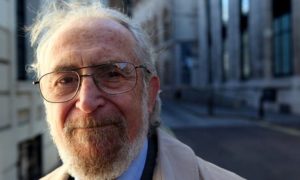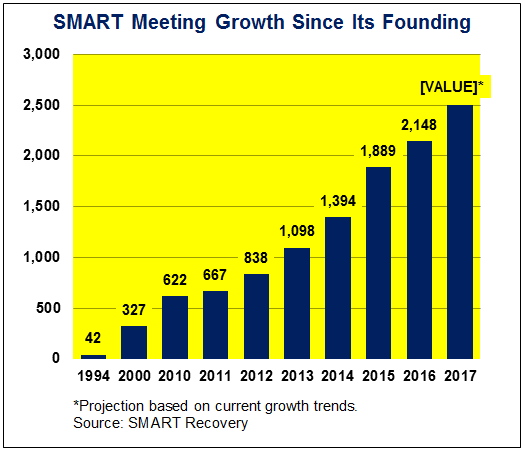Harvard Humanist of the Year Issues Call for Facilitators to Lead SMART Recovery Meetings

A quarter century ago, renowned humanists such as Albert Ellis, Michael Werner, Joe Gerstein (pictured here) and many others played an integral role in the founding of SMART Recovery—a secular, science-based, self-empowering mutual support program for people recovering from addiction. No higher power and no declaration of being powerless are required to attend meetings based on SMART—which stands for Self-Management And Recovery Training. The Humanist detailed the ins and outs of how SMART works in an April 2015 cover story.
This program has proven to be so successful that the demand for SMART meetings is exceeding the supply of trained facilitators to lead them. Over the past five years alone, the number of meetings has tripled, with a projection of reaching 2,500 by the end of 2017.
To help meet this growing demand, Dr. Gerstein, 2016 Harvard Humanist of the Year, is seeking help from the humanist community. He is the founding president of SMART Recovery and maintains that, “Humanists are especially well suited to lead SMART meetings—caring, compassionate, intelligent, and generous with your time and money, especially to join the cause to address one of the most serious public health crises of modern times.”
SMART’s facilitator needs are acute among those who lead online meetings. People attend these with headsets and web links, and SMART must cap the number per meeting at thirty to give everyone an opportunity to participate. Many people are turned away from these meetings when electronic access is closed.
As a result, SMART is recruiting facilitators specifically for the weekly online meetings, aiming to increase the current twenty-eight to as many as twice that number. SMART needs facilitators for in-person meetings too, but attendance of these is limited to people who live within a fifty- to 100-mile radius. Online meetings have no geographical limitations and facilitators don’t have to travel either. In addition, some participants prefer the extra measure of privacy that online meetings provide.
The need for addiction recovery support cannot be overstated. In the US alone, alcohol misuse contributes to 88,000 deaths per year, and drug overdoses, most involving opioids, take another 47,000 lives according to Facing Addiction in America: The Surgeon General’s Report on Alcohol, Drugs, and Health (2016). The suffering extends to the millions of family members and friends who must care for loved ones battling addiction.
 The scope of this problem is far worse since only one in ten Americans with substance use disorders—more than 20 million people – seek treatment. Stated reasons for not seeking treatment include: it’s not available, they can’t afford it, or they fear the stigma associated with being viewed as an “addict” or “alcoholic.” SMART meetings address these concerns by discouraging the use of stigmatizing language. There is no fee for attending, and the online ones are available to anyone everywhere. While SMART is not a treatment program or therapy, numerous people have recovered from addictions using it alone or in combination with other measures.
The scope of this problem is far worse since only one in ten Americans with substance use disorders—more than 20 million people – seek treatment. Stated reasons for not seeking treatment include: it’s not available, they can’t afford it, or they fear the stigma associated with being viewed as an “addict” or “alcoholic.” SMART meetings address these concerns by discouraging the use of stigmatizing language. There is no fee for attending, and the online ones are available to anyone everywhere. While SMART is not a treatment program or therapy, numerous people have recovered from addictions using it alone or in combination with other measures.
Joe invites humanists to “Come take our training and join our team of dedicated online and face-to-face meeting facilitators. Upon graduation, you’ll be committing to one ninety-minute meeting per week. If you can’t afford the $75 training fee, we’re giving away ten free courses to readers of the Humanist magazine and TheHumanist.com. SMART offers ongoing training and support to our valuable volunteers.”
Learn more here or call Christi Farmer, assistant executive director, at 440-951-5357.
Like Joe, you can truly be a lifesaver.
